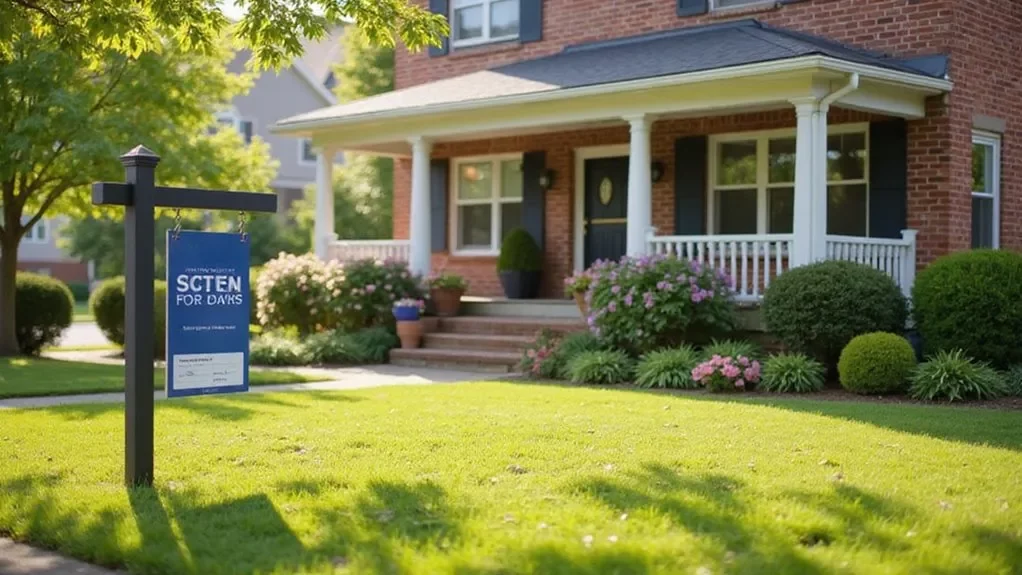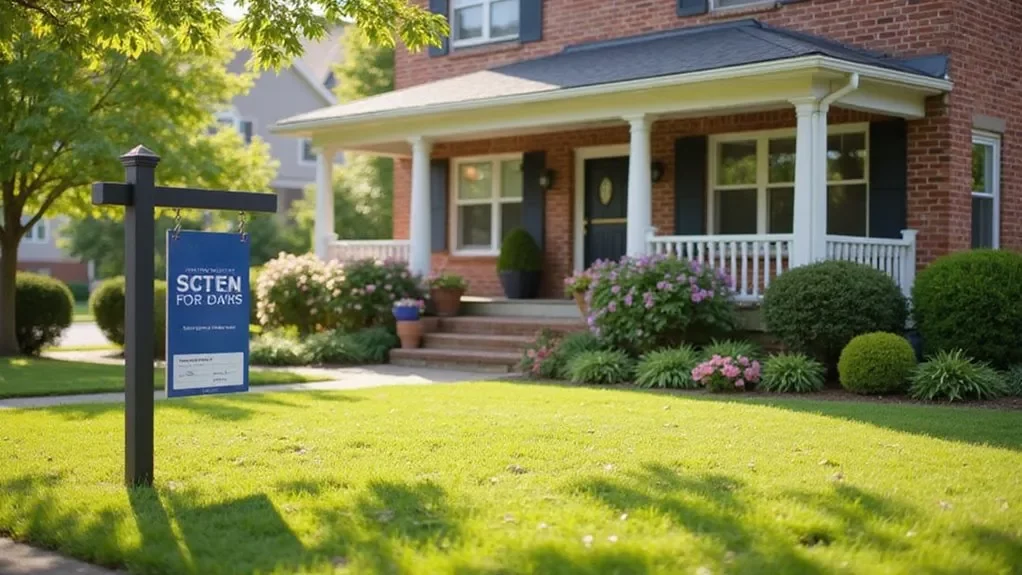Trapped under the weight of your mortgage while dreaming of a new address? Many homeowners feel stuck, believing they must fully pay off their loan before selling. This financial misconception creates unnecessary stress when timing matters in real estate markets. Fortunately, selling your home before clearing your mortgage is entirely possible with proper planning.
Yes, you can absolutely sell your house while still having a mortgage. The existing loan will be paid off during the closing process using proceeds from your sale. Before listing, you’ll need a payoff quote from your lender. This quote shows exactly how much you owe.
In this blog I will explore everything related to selling a house with an outstanding mortgage.
Key Takeaways
- Selling a home with a mortgage is possible; the loan is paid off during closing with sale proceeds.
- Obtain a payoff statement from your lender to determine the exact amount owed before listing.
- If sale proceeds don’t cover the mortgage, you may need to provide additional cash or negotiate a short sale.
- Selling to cash buyers can speed up the process and reduce complications related to existing loans.
- Consult professionals like OC Real Estate for guidance on valuation, legal requirements, and maximizing profit.
Can You Sell a House with a Mortgage?

Yes, you can sell a house with a mortgage. You simply need to pay off the loan during the closing process using your sale proceeds.
Request a payoff statement from your lender before listing. This document shows the exact amount needed to clear your debt. Mortgage balance must be paid in full at closing to legally transfer ownership. The settlement agent handles this payment directly from the sale funds.
Furthermore, coordinating with your lender ensures everything proceeds smoothly. Buyers expect a clean title without existing loans. Your prompt attention to these details protects everyone’s interests in the transaction.
What Happens to Your Mortgage When You Sell?

When you sell your home, the mortgage must be paid off entirely before transferring ownership.
You’ll need a payoff statement to determine the exact amount, including principal, interest, and fees.
If your home’s equity covers the mortgage, you’ll receive any remaining funds—if not, you may need to cover the difference.
Understanding Mortgage Payoff
A mortgage must be paid off completely when you sell your home. This process releases the lender’s claim on your property.
You’ll need to request a payoff statement from your lender showing the exact amount due.
The statement includes your remaining balance, interest, and any fees. Your closing proceeds will cover this amount automatically. The title company handles this transaction during closing.
Furthermore, your lender will then release the property lien. This step ensures the new buyer receives the home free of your debt obligations.
The payoff amount is typically higher than your last statement balance.
The Role of Home Equity in Selling
Home equity determines your profit when selling a house. It’s the difference between your property value and remaining mortgage balance. Positive equity creates profit after paying off your loan. Negative equity means you owe more than your home is worth.
Your equity position affects several key financial decisions during the sale process. Homeowners with substantial equity often have more flexibility with pricing and repairs.
Those with limited equity may need to consider timing or saving additional funds. This financial foundation helps you plan realistically.
You’ll know whether to expect proceeds, break even, or prepare for additional expenses. Your mortgage payoff amount directly impacts your next steps.
How to Sell a House with an Existing Mortgage?

To sell your house with an existing mortgage, you need to quickly determine your home’s current market value and your remaining mortgage balance.
Then, work with a real estate agent or a cash buyer to enable a smooth transaction and prepare your home for sale.
Finally, navigate the closing process carefully to ensure your mortgage is paid off and the property transfers legally.
Determining Your Home’s Current Market Value
You can determine your home’s market value through multiple methods. Professional appraisals provide the most accurate assessment. Local real estate agents can conduct comparative market analyses using recent sales data.
Several factors affect your home’s value including location, size, condition, and recent neighborhood sales. Online valuation tools offer quick estimates but often lack precision. These automated systems can’t account for unique property features or recent improvements.
For mortgage-related decisions, accurate valuation helps avoid financial shortfalls. Most homeowners benefit from combining professional opinions with their own research.
This approach ensures you have realistic expectations when selling or refinancing.
Calculating Your Remaining Mortgage Balance
To find your remaining mortgage balance, ask your lender for a loan payoff statement. This document shows exactly what you owe, including any interest and fees.
The payoff amount often differs from what appears on monthly statements. Request this information when you’re close to selling your home.
Lenders may add daily interest charges until the loan is fully paid off. Time matters here. A prompt request ensures you receive accurate figures for your home sale.
Working with a Real Estate Agent or Cash Buyer
You should choose between a real estate agent or cash buyer based on your priorities. Agents provide market expertise and negotiation skills for better prices. Cash buyers offer faster closings without financing contingencies.
Your mortgage situation requires full transparency with any potential partner. The sale proceeds must cover your remaining loan balance plus closing costs. Many agents have experience with mortgage-related sales.
The right professional can guide you through paperwork requirements. Additionally, they’ll help structure the deal to ensure proper mortgage payoff during closing.
Preparing Your Home for Sale
Fix repairs and clean thoroughly before listing your home with a mortgage. Address all maintenance issues that could affect buyer interest. Complete a deep cleaning of every room to create a positive impression.
Stage your space by removing personal items and arranging furniture to showcase room potential. Declutter closets, countertops, and storage areas to make spaces appear larger.
Professional photos will highlight these improvements effectively. Furthermore, price your home correctly based on current market conditions.
Research comparable properties that have sold in your neighborhood within the last 90 days. Consider working with a real estate agent who understands local trends.
Navigating the Closing Process
Your existing mortgage must be paid in full before transferring property to a buyer. Request a final payoff statement from your lender first. This document lists the exact amount needed to clear your debt.
Mortgage payoff amounts must include principal, interest, and any fees due at closing.
Contact the title company handling your transaction next. They coordinate payment timing with your lender.
Most importantly, ensure you receive a mortgage satisfaction document. This legal proof shows your loan is paid off.
The buyer’s purchase funds typically cover your remaining mortgage balance. Your title then transfers cleanly without debt attached.
What If You Owe More Than Your Home Is Worth?
If you owe more on your mortgage than your home is worth, you need to act fast to avoid deeper financial trouble.
Investigate options like a short sale, where your lender might accept less than owed, or negotiate directly to find alternatives with your lender.
Ignoring the situation could lead to foreclosure, so get professional advice now to protect your rights and finances.
Short Sale Options
A short sale allows you to sell your home for less than what you owe on your mortgage. This option helps avoid foreclosure when your home value falls below your loan balance. You’ll need lender approval and must prove financial hardship through documentation. Working with real estate professionals improves your chances of success.
The lender must agree to accept the sale price and forgive the remaining loan balance. Your credit score will still drop, but less severely than with foreclosure.
Throughout the process, maintain your property in good condition to attract buyers. Meanwhile, prepare for post-sale housing arrangements.
Foreclosure Alternatives
Several options exist when you owe more than your home is worth. A short sale lets you sell your property for less than the mortgage balance. This approach causes less credit damage than foreclosure. You can also pay the difference at closing to protect your credit score. This option requires significant upfront cash.
Renting your property offers another solution. You can wait for home values to increase while collecting rental income. Monthly rental payments may cover some or all of your mortgage costs.
Consider your financial situation carefully before deciding. These alternatives help homeowners avoid foreclosure while managing underwater mortgages effectively.
Negotiating with Your Lender
Contact your lender immediately when your mortgage balance exceeds your home’s value. Document your financial hardship thoroughly with income statements, expense records, and bank statements.
A well-crafted hardship letter explains why you need relief and shows your commitment to resolution.
Furthermore, hiring a real estate agent with short sale expertise improves your chances.
Short sales may impact your credit score by 85-160 points, depending on your starting score. In addition, lender approval is mandatory before proceeding with any short sale transaction.
Can You Sell a House with a Second Mortgage?
You can sell a house with a second mortgage, but you must pay off both liens at closing.
Make sure to get payoff statements from all lenders so you’re clear on the total amount owed.
If sale proceeds are insufficient, you may need to negotiate a short sale or cover the gap yourself—timing and communication are critical.
Understanding Home Equity Loans and HELOCs
Yes, you can sell a house with a second mortgage or HELOC. The process requires careful planning to clear all liens before finalizing the sale. You need a payoff statement from your lender first.
Sale proceeds must cover both your primary mortgage and any home equity loans.
Check for prepayment penalties in your loan terms. These fees can reduce your profit margin unexpectedly.
If your sale price falls below your total debt, consider negotiating a short sale with lenders. In such cases, quick action protects your credit score and financial future.
Paying Off Multiple Mortgages at Closing
All mortgages must be paid in full when you sell a property with multiple liens. You need payoff statements from each lender before closing.
The sale proceeds must cover the total amount owed on all mortgage liens. This ensures clear title transfer to the new owner.
If your sale price won’t cover all mortgage debts, prepare to bring additional cash to closing.
Another option is to negotiate a short sale with your lenders. In either case, work closely with your closing agent. They’ll handle the proper distribution of funds to each mortgage holder.
What Are the Tax Implications of Selling with a Mortgage?
You may face capital gains tax when selling a home with an existing mortgage. This tax applies to profits above the exemption threshold.
Single filers can exclude up to $250,000 in profit, while married couples filing jointly can exclude up to $500,000.
Negative equity situations require special attention. If your lender forgives part of your debt, the IRS may consider this forgiven amount as taxable income under certain circumstances.
As a result, keeping detailed records of all home improvements is essential. These expenses can increase your cost basis and potentially reduce taxable gains.
Furthermore, certain selling costs may qualify as deductions. For personalized guidance, consult a tax professional before listing your property.
How Can Cash Home Buyers Help with Mortgaged Properties?
Selling to cash home buyers speeds up your sale by providing quick, all-cash offers that let you pay off your mortgage immediately.
They buy “as-is,” so you avoid costly repairs and lengthy negotiations, reducing your closing costs and stress.
With faster closings, you can settle your mortgage and move on without the risk of deal fall-throughs or delays.
Benefits of Selling to Cash Buyers
Cash buyers provide faster sales without mortgage complications. They typically close deals within days rather than weeks or months. You’ll avoid waiting for lender approvals and extensive paperwork. Furthermore, these buyers help reduce overall transaction costs.
Cash sales typically save sellers 2-5% in closing costs compared to traditional sales. Cash offers also come with fewer contingencies. This means less risk of deals falling through due to financing issues.
Additionally, you’ll face fewer inspection demands and repair negotiations. Most importantly, cash sales simplify the legal process. You can quickly move forward with your life without property burdens. Many sellers appreciate the certainty and reduced stress these transactions provide.
Faster Closing Timeline
Cash buyers typically close in 7-14 days compared to traditional sales that take 30-45 days. This accelerated timeline happens because cash purchases bypass lender approvals and complex financing requirements.
You’ll receive funds quickly, allowing fast payoff of any existing mortgage balance. The process works efficiently even when your property still has a mortgage.
Most cash buyers handle the paperwork and coordination needed for a smooth closing. This speed provides immediate financial relief and allows you to move forward with your plans sooner.
Furthermore, a faster closing means less time dealing with showing your home or managing the stress of a lengthy sale.
Reduced Closing Costs
Cash buyers help sellers save money on closing costs. You’ll avoid various mortgage-related expenses when dealing with cash purchasers.
Traditional sales typically include lender fees, appraisal costs, and longer processing times. Cash transactions eliminate these requirements. The process moves faster without financing contingencies or bank approvals.
Your paperwork decreases significantly as well. As a result, you’ll keep more money from your sale. Many sellers find this financial advantage compelling when comparing offers.
Furthermore, the simplified process creates less stress during the transaction.
As-Is Purchase Options
Cash home buyers purchase properties in their current condition. This option benefits sellers with existing mortgages by simplifying the transaction process. Cash buyers typically handle mortgage payoffs and help with underwater properties. You can avoid legal complications when selling a distressed home this way.
The transaction happens faster than traditional sales. Most cash buyers close within 7-14 days after agreement. This speed provides immediate financial relief for sellers facing urgent situations.
Moreover, these buyers usually waive inspection contingencies and repair requests. Your responsibility ends at closing, freeing you from ongoing property concerns.
Cash sales serve sellers who prioritize convenience over maximizing profit.
Ready to Sell Your Mortgaged Home in Kentucky? Contact OC Real Estate Today!
You can sell your mortgaged home in Kentucky through OC Real Estate. The process requires paying off your existing mortgage from the sale proceeds.
First, contact OC Real Estate for an expert property valuation. Our agents understand Kentucky real estate laws and will guide you through each step.
We recommend getting a payoff statement from your lender to confirm your exact debt amount.
Spring and summer typically yield better offers in Kentucky’s market. Many families prefer moving during school breaks. OC Real Estate handles all paperwork and negotiations to maximize your profit.
Frequently Asked Questions
What Happens if You Sell Your House Before Paying off Your Mortgage?
You must pay off your mortgage with sale proceeds before transferring ownership. If funds fall short, consider a short sale or negotiate with your lender. Act quickly; legal and financial consequences await if you delay or fail to satisfy the debt.
What Is the 2 Rule for Paying off a Mortgage?
You must own and live in your home for at least two of the past five years to qualify for capital gains tax exclusion. Act now—this rule helps others and maximizes your financial benefits when selling or paying off your mortgage.
What Does Dave Ramsey Say About Selling Your House to Pay off Debt?
Dave Ramsey urges you to sell your house if it helps eliminate high-interest debt quickly. Use the proceeds wisely to pay off loans, reduce financial stress, and build a solid foundation for helping others and securing your family’s future.
Do I Need to Tell My Mortgage Company if I Sell My House?
Yes, you must inform your mortgage company immediately. Doing so ensures a smooth payoff process, prevents delays, and helps you avoid legal issues. Stay proactive, communicate clearly, and serve others by handling your sale responsibly and promptly.

